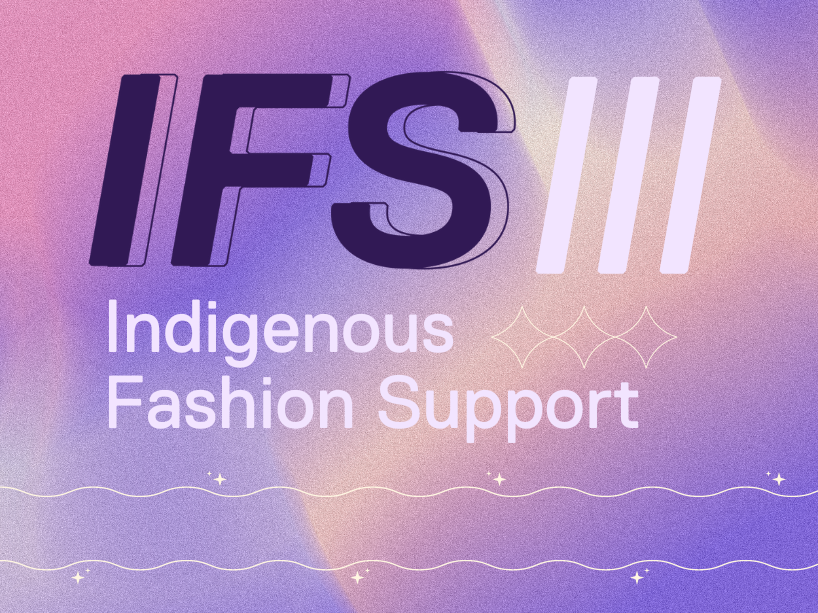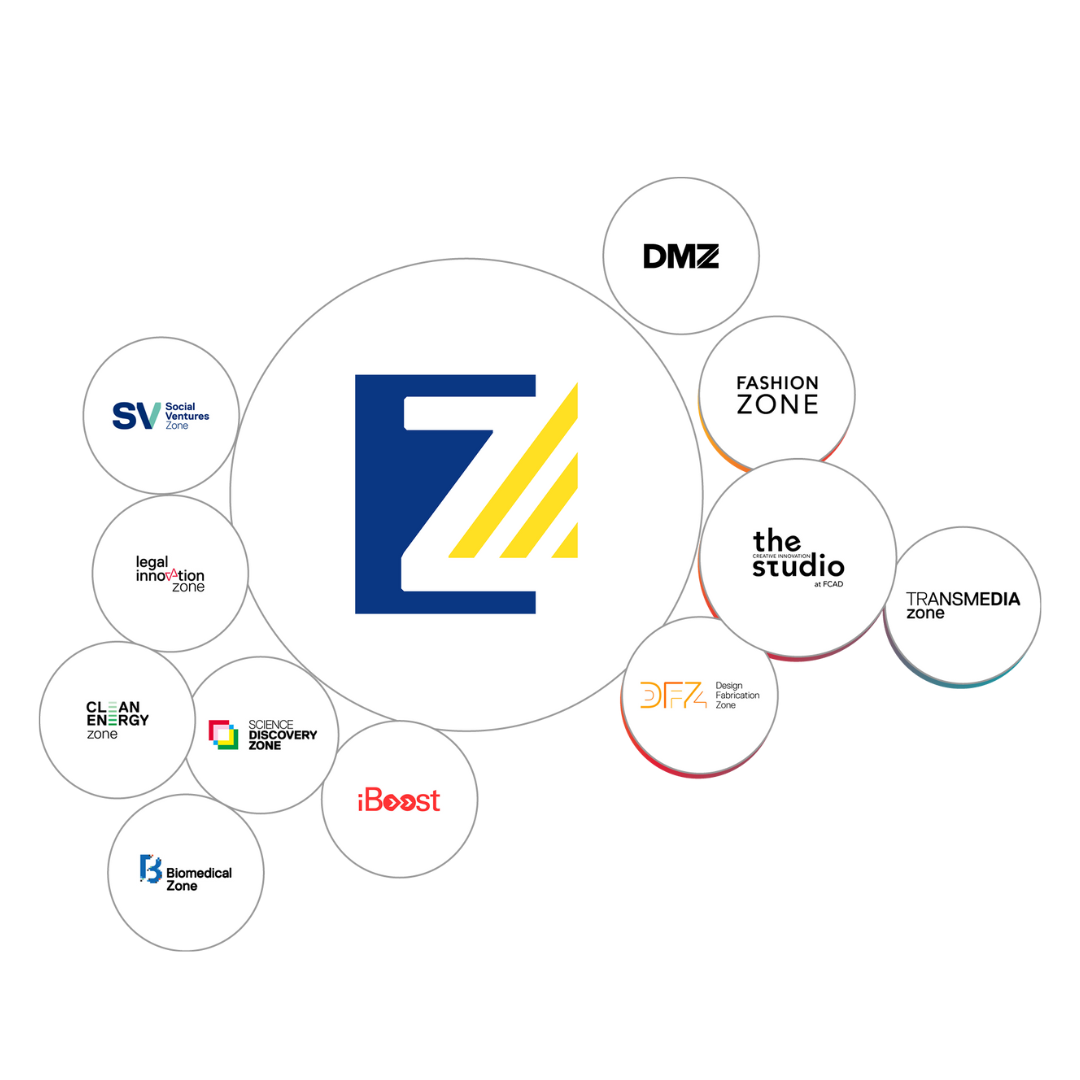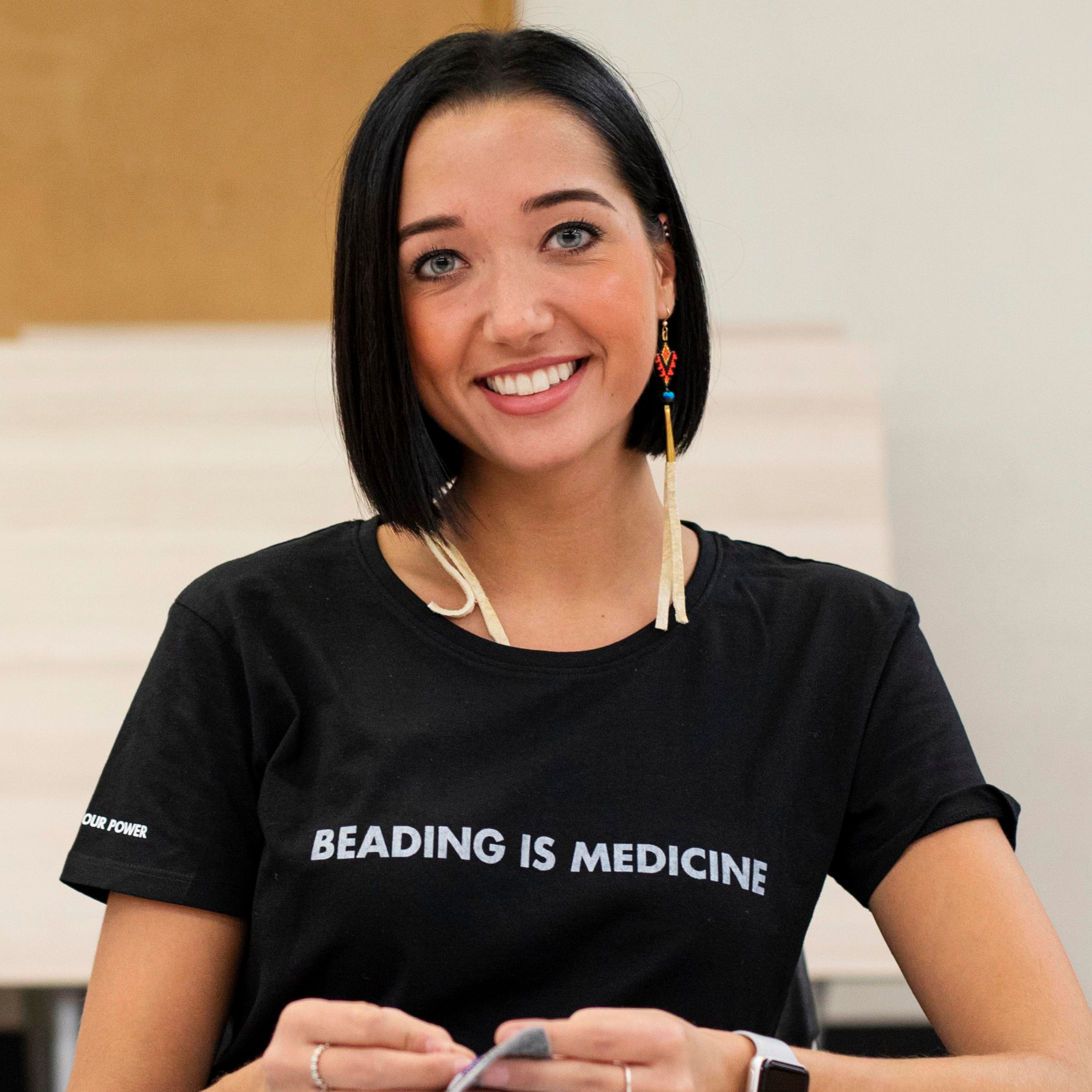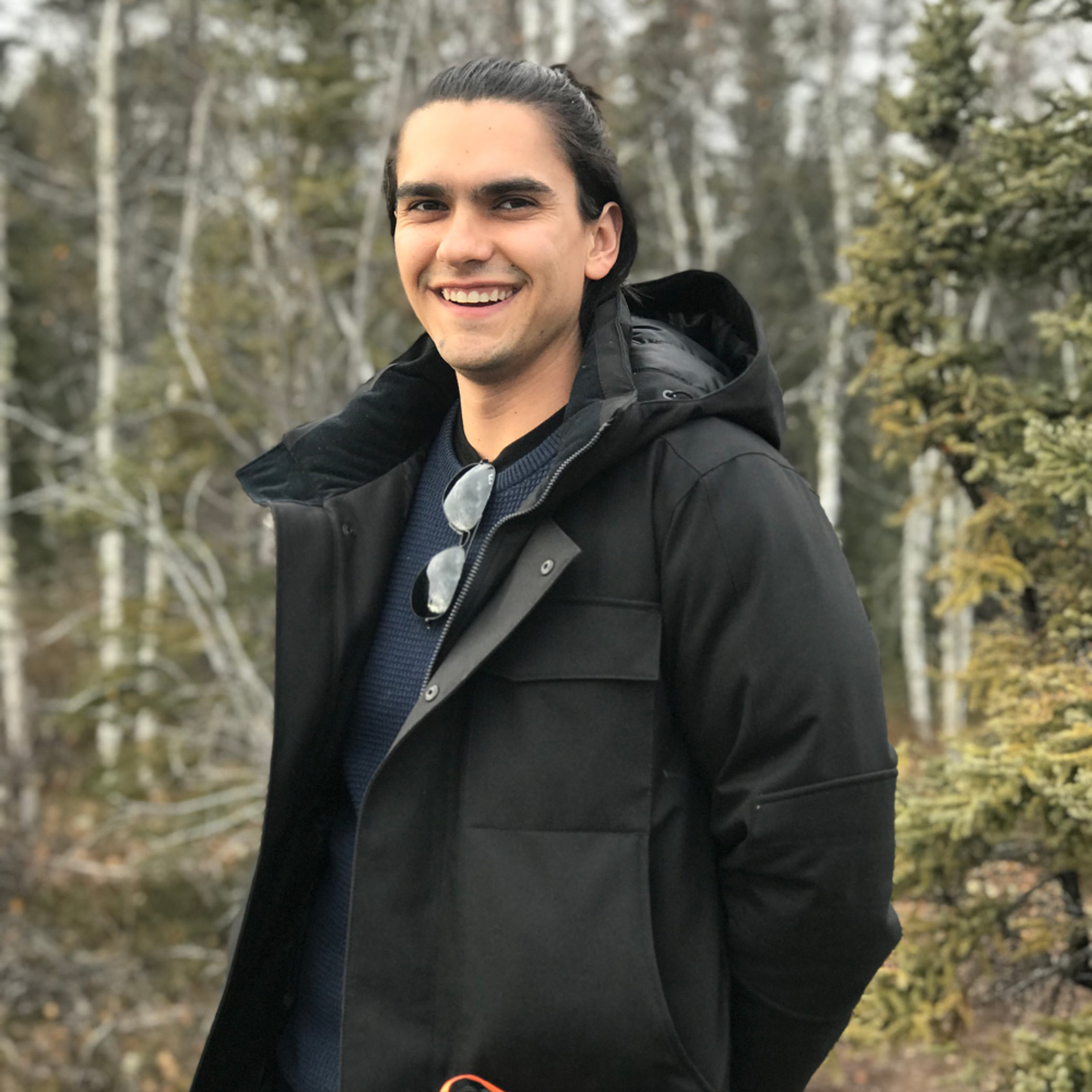Indigenous Fashion Support
The Indigenous Fashion Support (IFS) Program is a national virtual incubation program that supports Indigenous entrepreneurs to experience the journey of building a business in the fashion industry. With a focus on fashion, product and technology, the program enables participants to sharpen their entrepreneurial skills while developing real-life solutions.
The IFS program combines the Trauma of Money (external link) curriculum with mentorship from industry experts in order to take participants from ideation to commercialization, with as little risk as possible. The IFS program is open to Indigenous TMU students, alumni, and external community members 18+. The program also is open to all self-identifying Indigenous people in Canada. Courtesy of sponsor Export Development Canada, applicants selected for the program will receive up to $2,000 in technology and up to $500 in seed funding to support their participation and early success.
Applications for the IFS Cohort are now OPEN! If you have any questions with the application, please contact fashionzone@torontomu.ca.

IFS Partners
The Ben and Hilda Katz Charitable Foundation
About IFS
Through the program, participants will:
- Discover and develop ideas through the IFS C3 curriculum
- Validate ideas through research and data-driven decision making
- Develop a minimum viable product (MVP)
- Establish go-to-market strategies
- Work with mentors and industry advisors to get support in business development
- Access workshops/programming through the Fashion Zone and Zone Learning community
- Gain exposure to industry-standard prototyping and design tools and equipment
- Meet like-minded creatives
Program Timeline
The program takes place January 10th - July 7th, 2023, and is entirely virtual. At the end of the 25-week program, teams will submit a video pitch to our panel of experts and receive a certificate of completion.
Interested students can apply with a business idea or with an existing business in the early stages.
Program Objectives
- Support the objectives and recommendations of the Toronto Metropolitan University Truth and Reconciliation Report* and the Academic Plan
- Support the Indigenization of Zone Learning at Toronto Metropolitan University
- Support Indigenous students, alumni and community members to expand entrepreneurial skills through experiential learning
- Better understand the needs of Indigenous entrepreneurs
- Increase engagement within the Indigenous community
- Influence the next generation of Indigenous designers and entrepreneurs
*The IFS supports the objectives and recommendations of the Truth and Reconciliation Report
- Indigenize teaching and learning practices. By collaboratively developing new Indigenous-focused programs that centre traditional knowledge of design and entrepreneurship, the IFS indigenizes its own teaching and learning practices that can be applied throughout the Office of Zone Learning;
- Improve and expand support for indigenous learners and ensure Indigenous student retention. Our current programming does not align with Indigenous teachings; thus, we do not attract/retain Indigenous entrepreneurs. Since the launch of the IFS, the zone has increased indigenous enrolment by 200%, retention by 400%. We have also launched fundraising efforts for the BIPOC Women in the Fashion Zone Prize, aiming to provide black and indigenous members with grants.
- Increases Indigenous staff and faculty and recognizes other ways of knowing for faculty and students. We plan to hire Indigenous staff to run and grow the program (STT position and work-study positions for Indigenous students) with the proposed program expansion. We will reach the community through our network and by engaging Indigenous student groups at Toronto Metropolitan University. We understand that there are instances where non-Indigenous staff can be insensitive to Indigenous issues. Current Fashion Zone staff who interact with IFS participants have been enrolled in Indigenous awareness training (D2L course), offered by TRSM and the 4 seasons of reconciliation.
- Deepen engagement and establish partnerships with the local community, Indigenous communities and other post-secondary institutions. Through the IFS, we will make zone education accessible to fashion and design communities across Canada and champion the initiative by recruiting participants, mentors and partners.
Applicant Requirements
To participate in the IFS program, applicants should:
- Self-identify as Canadian Aboriginal (First Nation, Métis, Inuit) or Indigenous from elsewhere residing in Canada.
- Have an interest in entrepreneurship or a business idea/innovative solution
- Submit a complete and qualifying application form
- Be available during the length of this program
- Have the ability to work on their project for 10 -15 hours per week
- Participate in mandatory scheduled meetings and virtual workshops
IFS Advisory Circle
IFS Participants 2021 - 22
Heather Bouchier Design (external link) is an Aboriginal Designer originally from the Beardy's & Okemasis First Nation in Saskatchewan. She creates Cree fashion and jewellery. Heather Bouchier Design has been based in Edmonton, AB for the last 7 years.
Raónraon Creations (external link) founder, Rosalee Laurena Mitchell, became interested in creating beautiful beadwork based on her personal mission to find a grounding outlet that would feed the soul, and connect to ancestors. She can truly say every handmade piece is created with an abundance of passion and care.
Rosalee was fortunate to have the guidance and teachings of my beadwork journey facilitated by a very dear friend. She loves incorporating traditional Mohawk colours into Raónraon Creations, and enjoys creating pieces that emanate the radiance of nature's beauty.
Susan Hill, creator of Eli'sawey (external link) is an Mi’kmaq/Iroquois sewist who’s focus is to create both traditional and culturally inspired clothing and accessories.
Assinewe Jewelry (external link) offers polymer clay and beaded jewelry that are influenced by traditional Ojibwe designs made contemporary.
Nanaboozho’s Beads is made by Two Spirit artist Caitlin Nanibush. Nanaboozho is the trickster in Anishinaabe culture and is often known as a shapeshifter. Like Nanaboozho, Two Spirit people can also shapeshift at times. Nanaboozhos’s Beads is an alternative brand that uses creepy/Kawaii aesthetic with an Indigenous twist.
White Horse Rider Co (external link) is a new project by Brenda Marie Mercer. She makes various types of Indigenous-style jewelry and crafts.
IFS Participants 2020 - 21
Jospehine Kent wanted to solve the issue of limited choice and accessibility to unique and fashion pieces. That’s when she developed Verseau (external link) , a newly-launched line of female swimwear and lingerie based in Etobicoke, Ontario. Verseau’s products are handmade and designed locally in Toronto using high quality and individually sourced fabrics. Josephine is an artistic entrepreneur with a passion to create when inspired. Each idea of her personal ideas is expressed through what she designs, making sure to prioritize accessibility and affordability. Verseau wants to expand their demographic by planning a men’s fashion collection in the future. Josephine also answered these questions about her most important design pieces, and the creators that inspire her.
What makes Indigenous designers and entrepreneurs stand out from the rest?
Indigenous designers have a unique way of creating pieces by using ethically sourced materials from all parts of North America in their designs and art.
What is the most important fashion or design piece you have designed/created and why?
The most important piece I have created is a face mask because of today's challenging times. I wanted to provide a protective mask to keep people feeling safe when doing everyday tasks.
Who are some of your favourite Indigenous designers?
Some of my favourite indigenous designers include, Niio Perkins (external link) , Manitobah Mukluks (external link) , and Catherine Blackburn (external link) .
Onizhishin Designs (external link) is a handmade beaded jewelry company that focuses on the reclamation Indigenous culture. They combine contemporary and traditional design elements to reflect the Indigenous modern lifestyle. With a mission to celebrate and foster the connection to culture through art, Onizhishin wants to increase the visibility of culture through crafts. Indigenous women and allies feel empowered when wearing these unique pieces.
Founder Ashley Lacourciere, based in Barrie, Ontario, launched her business this past summer. She uses beading to connect with her spirit and culture.
SS River Designs (external link) are art-to-wear women’s clothing inspired by intricate Métis beadwork by Christine Tienkamp. These design pieces celebrate Michif culture through beautiful scrolling flower beadwork patterns. All pieces are original and hand-beaded before being printed and sewn as contemporary pieces to make the Michif culture more widely available to all people.
Christine, based in St. Louis, Saskatchewan, is a fashion designer that has been creating Métis from a young age. The name SS River comes from the South Saskatchewan River where Christine was raised, along the banks of an important place in Métis history and her main inspiration. Christine also answered these questions to give us more insight on how to support Indigenous creators and designs.
What do you wish more people knew about Indigenous designs and businesses?
Indigenous designers who are connected to their indigenous values create enterprises that are inherently ethical, sustainable and community minded. We tend to have strong ties to community, and strive to think in holistic ways, knowing that all people are connected and therefore we are naturally social entrepreneurs. We are often stewards of our art and culture – weaving traditional methodologies into our work either carrying on traditional form or incorporating traditional elements into a contemporary context. Whether our creations are traditional or modern, we look for ways to be innovative while being mindful.
As beadwork artisans, we know the work cannot be rushed, we learn patience in beading. Sitting down to bead, your heart rate slows, you are present in the moment. Beadwork cannot be done without being mindful. I often think of the person that may enjoy the beadwork when it’s done, and how interesting it is that the beadwork artisan will touch every, single, bead....several times. When you pick up the bead, position it into place with your thumb, tack them down, and then we run our fingers over each line of beads as we sew, sometimes coaxing them to lay flat, and maybe some guidance for those beads means something. How unique is it for someone to receive a piece that is connected to the person that created it.
My designs are rooted in my French Metis heritage, with a strong connection to the land, my community is connected to the river and the homeland with ancestral ties. I feel fortunate that I was raised to be proud of my culture, as I know many people did not have that luxury. I have always been immersed in my culture but I do recognize the fragility of it, how easily it can be lost, as a young girl my mom learned how to bead after being handed down a box of beadwork supplies from my auntie, so we learned together. I hope in some small way that I can keep celebrating and sharing the beadwork that is specific to Metis people. I still have so much to learn about the culture, history and fashion of Metis women – it’s an exciting journey.
How can non-Indigenous people support Indigenous designers or respectfully engage with your cultural aesthetics?
When non-indigenous people support indigenous designers, they are participating in a social enterprise. Non-indigenous people can take the opportunity to learn about the designer and supporting an indigenous designer is a way of telling the designer’s story. Wearing indigenous designs may spark a conversation, and the culture can be shared! As a designer I want to help all people, indigenous and non-indigenous people connect with my unique culture, from it’s aesthetics to it’s history. I’m honoured when people from various backgrounds are interested in my designs, I can see they are coming from a good place and share similar values to me, I have found they wouldn’t have inquired or supported me otherwise. Any person wearing a piece from an indigenous designer can simply create space for a celebration of indigenous cultures and values.
Anishinaabae (external link) is an Indigenous-owned accessories line based in Thunder Bay and Toronto, Ontario that merges traditional and contemporary designs. These unique pieces are made with original Anishinaabe and Ojibway designs passed down from previous family generations. All materials used for each accessory are personally outsourced such as porcupine quills, birch, and animal fur. Anishinaabae is deeply rooted in family traditions and craftsmanship.
Kaitlyn Adams Lewis has been designing and selling regalia since she was a teenager. She studied Fashion Merchandising and Retail Management in Ryerson University, as well as started her own youth collective to assist with other startups before starting Anishinaabae.



